In our ever more complex and technological era, true person to person interaction is lost as we interact with each other via technology instead. (witness this blog) The technological revolution has brought us closer in one respect, but the need to interact in a wholesome way within our local community, person to person, is still vital.
Viola Spolin called her work Kindergarten for the 21st century. What she meant is that her work represents the fundamental skills needed for both actor and audience to meet and interact in a new and basic way. We meet as fellow players and learn from and depend on each other to create meaningful play.
The audience plays too. Nobody is a passive player in Spolin’s theater. This essence of play creates true community. Her work transcends the theater in this regard. Her work is way to become ‘part of the whole’. It is a way to shed the ills of the 20th Century; Ills such as authoritarian teaching and rote learning.
Spolin called this the Approval/Disapproval Syndrome and classified it as the basic obstacle to a true relation with ourselves, our environment, and each other. In Spolin Games, students and teachers work together, to discover and solve problems. Discovery learning is everyone’s birthright and when one discovers a path to a solution on their own, in their own way, learning is integrated and belongs to the discoverer.
The joy that accompanies this type of learning makes the exploration of any subject and the inherent skills acquired in the solving of the problem, meaningful and useful to the player forever. It is with this in mind that Viola Spolin began to formulate her theories.
Spolin chose to teach the disciplines of theater to express this greater goal. As a handbook for theater study, it has no peer. It is direct, practical, and easy (because it is fun). Improvisation for the Theater outlines a course of study that gives each and everyone the opportunity to play, be spontaneous, become self-aware and transform.
These skills are necessary for our work in the theater, but are also necessary for the bigger stage of our own lives. Fulfilling the requirements of a game creates a playing field where we all become fellow players. Playing is the great key that opens our individual treasure house of intuitive understanding and our ability to act in authentic and meaningful ways.

